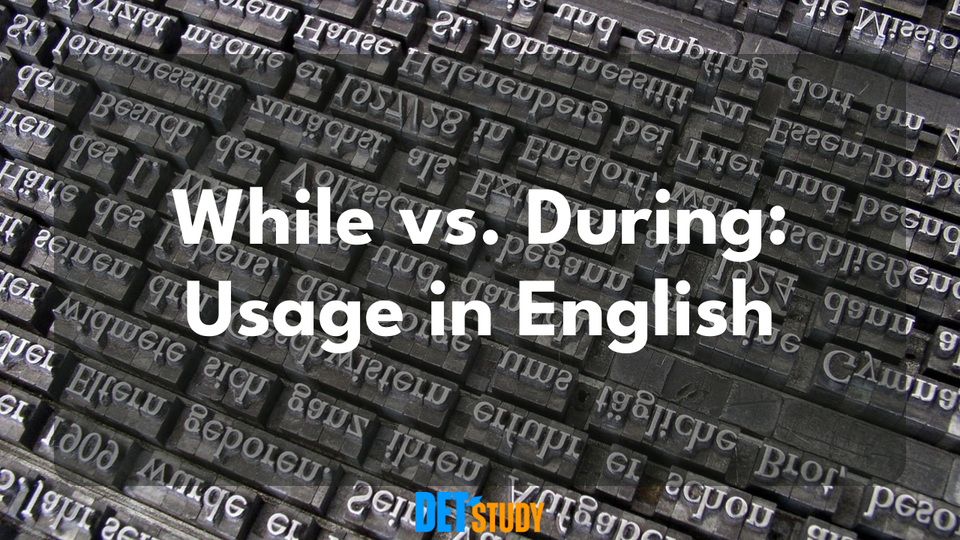While vs. During: A Guide to Correct English Usage

```html
Understanding "While" and "During"
Learning "while" and "during" significantly improves English communication, as both convey time-related concepts. Though similar, their distinct purposes are crucial. ⏳
"While" acts as a conjunction, connecting two actions happening simultaneously. It introduces a clause with a subject and verb. For example:
- She read a book while she waited for the bus. (Reading and waiting happen together.)
- I like to listen to music while I study.
"While" can also compare or contrast situations:
- While John prefers tea, his sister prefers coffee.
"During" is a preposition, specifying a time period when something occurs. It's followed by a noun or noun phrase, not a full clause. For example:
- He met many interesting people during his travels.
- The lights went out during the storm.
"During" highlights the timeframe an event takes place within. ⏱️
When choosing, consider: are you describing two simultaneous actions (use "while") or an event within a specific period (use "during")?
In summary, use "while" for simultaneous actions (subject + verb) and "during" for events within a time period (noun/noun phrase). This enhances clarity. 🎯
How to Boost Your Duolingo English Test Score by 10 PointsGrammatical Usage of "While"
"While" functions as a conjunction, indicating two or more simultaneous actions. It introduces a subordinate clause containing a subject and a verb. 📚
-
She cooked dinner while the children did their homework. (Cooking and homework happen together.)
-
I listened to the radio while I cleaned the house.
"While" also highlights contrast between situations:
-
While he loves classical music, his brother prefers rock. (Contrasting music tastes.)
-
While the lecture was interesting, it was also quite long.
Additionally, "while" can emphasize ongoing actions or interruptions:
- We were watching a movie when, while all of a sudden, the lights went out. (Sudden event interrupting an ongoing action.)
"While" is a versatile tool for complex sentences, effectively expressing time relationships, comparisons, and contrasts. ✍️
Grammatical Usage of "During"
"During" acts as a preposition, indicating a specific time frame for an event. Unlike "while," it takes a noun or noun phrase, not a clause. 🗓️
-
During the meeting, important decisions were made. (Decisions made within the meeting's duration.)
-
She drinks coffee during breakfast.
-
He read books during the summer holidays.
"During" emphasizes the time span an event occupies:
-
The museum is closed during the winter months. (Closed for the entire winter season.)
-
I heard a strange noise during the night.
It also describes events within broader periods:
-
She stayed calm during the exam despite the noise. (Calmness maintained throughout the exam.)
-
Many animals hibernate during winter.
"During" clarifies *when* something happens by pinpointing a time span with a noun or noun phrase, without needing a full clause. 📍
Common Mistakes and How to Avoid Them
Distinguishing "while" and "during" is vital. Here are common errors and how to fix them: ⚠️
Mistake 1: Mixing Functions
- Incorrect: She was talking during I was reading.
- Correct: She was talking while I was reading.
Reason: "During" takes a noun/noun phrase; "while" connects simultaneous actions with a subject and verb.
Duolingo Test PracticeMistake 2: Misusing "During" as a Conjunction
- Incorrect: I listened to music during I was doing my homework.
- Correct: I listened to music while I was doing my homework.
Reason: "During" doesn't link actions directly; "while" does for concurrent activities.
Mistake 3: Overusing "While" for Time Periods
- Incorrect: While the night, it was cold.
- Correct: During the night, it was cold.
Reason: "While" doesn't specify periods. Use "during" for time frames or events.

Mistake 4: Using "While" for General Time Frames
- Incorrect: We visited many places while our vacation.
- Correct: We visited many places during our vacation.
Reason: "While" is for simultaneous actions, not general time periods.
Mistake 5: Forgetting Contextual Use
- Incorrect: The phone rang while the night.
- Correct: The phone rang during the night.
Reason: Use "during" for events within larger contexts or periods.
Using Your Smartphone as a Second Camera for the Duolingo English TestTips to Avoid Mistakes
-
Identify Structure: "While" requires two clauses (subject + verb); "during" takes a noun/noun phrase for a time frame.
-
Practice: Create sentences like "I read while eating breakfast" vs. "I read during breakfast."
-
Remember Purpose: "While" = simultaneous actions/contrasts. "During" = specific time periods/contexts. ✅
Understanding these distinctions and practicing regularly will improve your usage of "while" and "during."
Start DET PracticeTips for Using "While" and "During" Correctly
To master "while" and "during," focus on their specific uses. 🤔
-
"While" for Simultaneous Actions/Contrast: Connects two clauses (subject + verb) for concurrent actions or comparisons. - Examples: "She was cooking while I was setting the table." / "I listened to the podcast while jogging."
-
"During" for Specific Time Periods: Refers to a period or event, always followed by a noun or noun phrase. - Examples: "He took notes during the lecture." / "The lights went out during the movie."
-
Distinguish Sentence Structure: "While" needs a subject and verb in its clause. "During" needs a noun or noun phrase. - Compare: "He sang while he drove." (Actions) vs. "He sang during the drive." (Time period) 🚗
-
Avoid Misuse: Do not use "while" with just a noun (e.g., "While the meeting"). Do not use "during" to link two actions directly (e.g., "I read during eating").
-
Visualize: Think of "while" for things happening *at the same time*, and "during" for things happening *within* a defined period. 📅
Regular practice with these distinctions will significantly improve your English accuracy. 🚀
DET Study offers 15,000+ practice questions to strengthen grammar, especially with adjectives and adverbs. Regular use builds confidence and precision for the Duolingo English Test, helping you achieve target scores.
🎯 Need more practice? Check out DETStudy.com for expert resources, 15,000+ practice questions, and AI-powered writing and speaking feedback.

```
